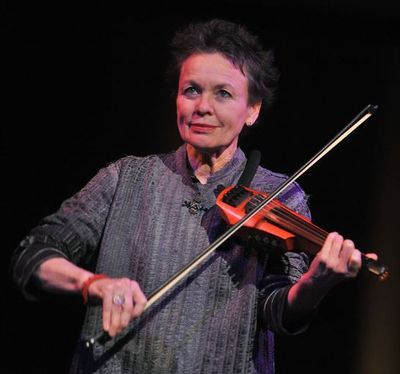Same time next year?

Laurie Anderson, 2010; photo by Henry S. Dziekan III/Getty Images
By ROBERT POTTS
In Laurie Anderson���s extraordinary performance piece (or poem, perhaps?) ���Same Time Tomorrow���, she murmurs the following lines:
���And so when they say things like
���We're gonna do this by the book���,
you have to ask ���What book?���,
because it would make a big difference if it was
Dostoyevsky or just, you know,
Ivanhoe.���
I was reminded of ���Same Time Tomorrow��� by National Poetry Day, an annual event, when various media and institutions get excited about this beleaguered and much misunderstood art. Not the day itself ��� it's hard to be curmudgeonly about such a good-natured attempt to remind the nation of the power and pleasure of a literary genre ��� but the press release for it, a pro-forma piece of boosterism which linguistically offends against much of what it ostensibly values (���an opportunity to break with the tyranny of prose���). For we are all urged to ���Make like A Poet��� ��� to ���dream, speak, love, live, act and think ���like a poet������.
Of all the dangers currently or allegedly facing Britain, I cannot think of any greater than the possibility that people might actually take this advice. ���Drink like a poet���, for example; or ���drive like a poet���. But ��� and here���s where Anderson���s lines came to mind ��� it would really depend on which poet. After all, ���live like a poet��� these days would mostly mean that we���d all pitch up at a university and teach creative writing to each other; or else head straight to the university library to pen memoranda and furtively look at a cupboard full of pornography. As for ���love like a poet���, the racier biographies of poets testify to somewhat erratic love lives, the recent Life of Ted Hughes being only the latest example. And ���think like a poet���? As a colleague remarked yesterday, they surely don���t mean ���going on the radio to broadcast anti-Semitic propaganda���.
Flippancy aside, this gimmick ��� that we should all ���make like a poet��� for a day or so ��� does highlight a few truths about the perception and mediation of poetry in Britain. For example, the perception that there is something peculiar about poets; a sense sustained by the titillating biographical approach the media takes to them, since the simple, quiet acts of writing and reading are hardly externally dramatic, and certainly not easily conveyed by television or film ��� whereas tormented love lives and drunken fights are good box office material. Here the Romantic stereotype of the poet ��� a visionary, a rebel, whose bad behaviour is excused by soaring, inspirational art ��� seems to have been strikingly durable.
We are often told that other countries, more exotic than Britain, are unusually devoted to poetry ��� Salman Rushdie���s The Jaguar Smile, a paean to Nicaragua in the 1980s, quotes Jos�� Coronel Urtecho���s line that "Every Nicaraguan is a poet until proven otherwise"; Liz Calder, the co-founder of Bloomsbury, makes a similar claim for Brazil: ���In Brazil the word for poet is sometimes used as a term of endearment, as in ���How are you, my poet���, although the person addressed may never have written so much as a couplet���. By contrast, in England (it would be unfair to include the Scottish, Northern Irish and Welsh), poetry is regarded as a charming eccentricity, valued (as National Poetry Day shows), but scarcely central: after all, we���re encouraged to do this just for a day, for a bit of fun, like dancing round a Maypole or carving pumpkins into ghoulish faces.
So there is a tension between the poet as somehow special, meriting (these days) a month of programmes on BBC television and radio, and a nationwide celebration of excellence, and the contrary idea that we all could and should regard ourselves as poets. On the one hand, there is an egalitarian view, recently seen in the vision of the new Labour leader Jeremy Corbyn (���I think there is an artist in every one of us, there is a poet in every one of us���), a dream of creativity shared by, among many others, Charles Ives: ���The day will come when every man while digging his potatoes will breathe his own epics, his own symphonies (operas, if he likes it) . . .���. On the other, there are the ���closed shop��� arguments of the poet Don Paterson, in his 2004 lecture ���The Dark Art of Poetry���: ���Only plumbers can plumb, roofers roof and drummers drum; only poets can write poetry. Restoring the science of verse-making would restore our self-certainty in this matter, and naturally resurrect a guild that, I believe, would soon find it had some secrets worth preserving���.
What could it mean, then, ���make like a poet���? Perhaps it just means ���being ourselves���. But with even less money, and even more drink.
Peter Stothard's Blog
- Peter Stothard's profile
- 30 followers



